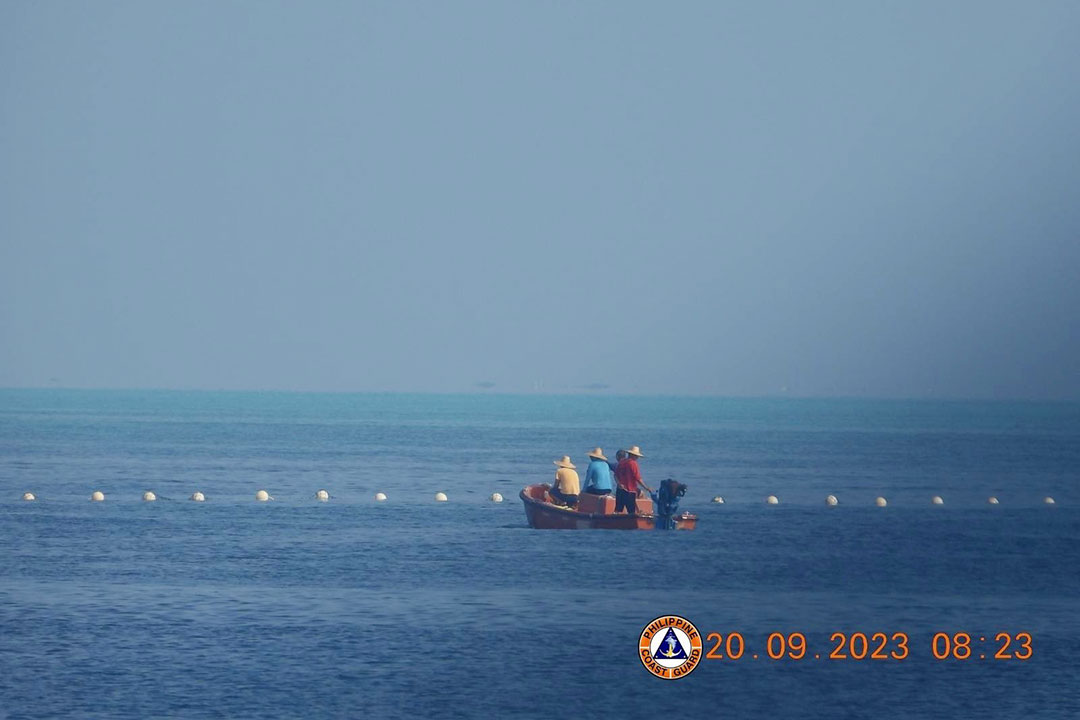Philippines to remove Chinese barrier at Scarborough Shoal, mulls lawsuit

By Kyle Aristophere T. Atienza and John Victor D. Ordoñez, Reporters
THE PHILIPPINES will take all appropriate action to remove barriers placed by China in a disputed area of the South China Sea, the country’s national security adviser said on Monday.
“We condemn the installation of floating barriers by the Chinese coast guard,” National Security Adviser Eduardo M. Año said in a statement. “The placement by the People’s Republic of China of a barrier violates the traditional fishing rights of our fishermen.”
The Philippines on Sunday shared images of a floating barrier blocking fishing vessel access in the Scarborough Shoal, with Chinese coast guard ships nearby, and said it would protect the rights of its fishermen.
The country’s Department of Foreign Affairs (DFA) said the barriers violated international law and that the Philippines would “take all appropriate measures to protect our country’s sovereignty and the livelihood of our fisherfolk.”
Chinese Foreign Ministry spokesman Wang Wenbin said China’s coast guard took necessary measures in accordance with law to block and drive away a Philippine vessel near Scarborough Shoal.
China claims more than 80% of the South China Sea, overlapping with the exclusive economic zones of Vietnam, Malaysia, Brunei, Indonesia and the Philippines. China seized the Scarborough Shoal in 2012 and forced fishermen from the Philippines to travel further for smaller catches.
Philippine Coast Guard and fishery bureau personnel discovered the floating barrier, estimated at 300 meters (1,000 feet) long, on a routine patrol on Sept. 22 near the shoal, locally known as Bajo de Masinloc, according to Commodore Jay Tarriela, a coast guard spokesman.
“We have to be very careful (not to commit) any diplomatic misstep,” he said in a radio interview on Monday before the government’s comments, when asked whether the coast guard was planning to remove the barrier.
Filipino fishermen say China typically installs such barriers when they monitor many fishermen in the area, Mr. Tarriela said on Sunday.
The Chinese boats issued 15 radio challenges and accused the Philippine ship and fishermen of violating international and China’s laws, before moving away “upon realizing the presence of media personnel onboard the (Filipino) vessel,” he added.
The Philippine Bureau of Fisheries and Aquatic Resources saw more than 50 Filipino fishing boats in the area during the patrol.
‘COMPLETELY ILLEGAL’
Also on Monday, Philippine Solicitor General Menardo I. Guevarra said the government is considering suing China again before a United Nations-backed arbitration court because of the barriers.
The Philippine government would review all incidents within its exclusive economic zone in the South China Sea since the 2016 arbitral ruling, which voided China’s expansive claims based on a nine-dash line map, he said in a text message.
“Filing a new complaint before the permanent court of arbitration is one of the legal options that the Office of the Solicitor General will carefully consider.”
Mr. Guevarra, a former Justice secretary cited incidents “involving reef destruction and floating barriers.” “We need solid evidence that will stand up in any tribunal. We will carefully evaluate the pros and cons of each legal option before we make any recommendation to the president and to the Department of Foreign Affairs.”
Earlier in the day, former Solicitor General Francis H. Jardaleza said China’s installation of the barrier is “completely illegal” because the Hague-based tribunal had ruled that Scarborough Shoal is a traditional fishing ground of Filipino, Chinese and Vietnamese fishermen.
“The arbitral tribunal in 2016 already ruled very clearly that the fishing there is for three countries,” he told the ABS-CBN News Channel. “That’s what we call artisanal fishing. The action of China is completely illegal.”
Mr. Jardeleza urged the government to file another case at the Permanent Court of Arbitration and seek damages.
He said the new case would supplement the 2016 arbitral ruling, which has been backed by various countries including the US, Japan, Australia and European nations.
The PCA in July 2016 affirmed the Philippines’ sovereign rights in areas within its exclusive economic zone that are being claimed by China, three years after the government under the late President Benigno S.C. Aquino III sued China.
Batangas Rep. Ralph G. Recto noted that due to China’s blockade, the “share of our fish catch in the West Philippine Sea has dwindled to 7% of total national fishery production.”
“Chinese constriction of the West Philippine Sea cripples a pillar of our food security, as that area contributes almost 30% of commercial fishery output,” he said in a statement, referring to areas of the South China within the Philippines’ exclusive economic zone.
The Philippine Senate should immediately pass a bill seeking to declare the Philippines’ maritime zones, Senator Emmanuel Joel J. Villanueva said. “This is a huge blow to the livelihood of our fishermen who rely on the ocean for their livelihood,” he said in a statement in Filipino, referring to the Chinese barrier.
“President Ferdinand R. Marcos., Jr. is one with us in believing that the immediate passage of the Philippine Maritime Zones Act is a priority.”
The priority bill seeks to establish and declare the country’s maritime zones and boundaries. The measure is being discussed by the Senate Special Committee on Maritime and Admiralty Zones. The House of Representatives approved a counterpart bill on final reading in May.
Chester B. Cabalza, founder of Manila-based International Development and Security Cooperation, urged the Philippine government to enforce its domestic environmental laws and address the latest incidents through “high-level diplomatic approaches.”
“The arbitral award that we won in 2016 is the penultimate case against China that encompasses greater resolutions on Manila’s strategic difference and environmental issues with Beijing,” he said. But it has been “hindered by enforceability issues in the past seven years since the award.” — with Reuters



